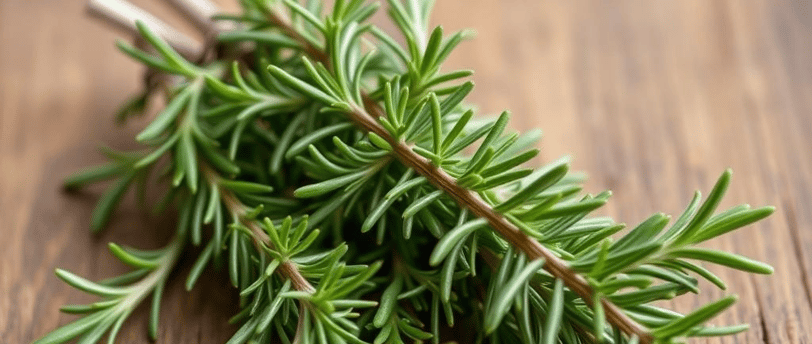Rosemary for Heart Health: The Aromatic Herb That Boosts Circulation and Protects Your Heart
❤️HEART HEALTH


Rosemary (Rosmarinus officinalis) is often celebrated for its fragrant aroma and culinary versatility. Yet, beyond its use in the kitchen, this herb has garnered attention for its potential heart health benefits. Recent studies suggest that the compounds found in rosemary may improve circulation, protect against oxidative stress, and promote cardiovascular wellness. In this article, we'll explore the various forms available, recipes using rosemary, appropriate dosages, potential side effects, precautions, and the scientific basis supporting its role in heart health.
Forms Available
Rosemary comes in various forms, making it easy to incorporate into your daily routine. The most common forms include:
Fresh Rosemary: Often found in the produce section of grocery stores, fresh rosemary can be used in cooking and garnishing dishes.
Dried Rosemary: A staple in many kitchens, dried rosemary retains much of the herb’s flavor and can be used in spice blends, marinades, and baked goods.
Rosemary Essential Oil: Extracted from the leaves of the plant, rosemary essential oil is popular in aromatherapy and topical applications. It is important to note that essential oils should always be diluted before use on the skin.
Rosemary Tea: Steeping fresh or dried rosemary leaves in hot water creates a fragrant tea that can be enjoyed alone or with honey and lemon.
Supplements: Rosemary extract is available in capsule form, making it convenient for those looking to reap the herb's benefits without the need to cook with it.
Recipes to Incorporate Rosemary
Adding rosemary to your culinary adventures is not only delightful but may also enhance your heart health. Here are a few recipes that highlight this aromatic herb:
1. Roasted Rosemary Potatoes
Ingredients:
1 lb baby potatoes
2 tbsp olive oil
2 tbsp fresh rosemary, chopped
Salt and black pepper to taste
Instructions:
Preheat the oven to 400°F (200°C).
Toss the potatoes with olive oil, chopped rosemary, salt, and pepper in a large bowl.
Spread the potatoes evenly on a baking sheet and roast for 25-30 minutes, or until golden brown and crisp.
2. Rosemary Lemon Grilled Chicken
Ingredients:
4 chicken breast halves
Juice of 2 lemons
3 tbsp olive oil
3 tbsp fresh rosemary, chopped
Salt and pepper to taste
Instructions:
In a mixing bowl, combine lemon juice, olive oil, rosemary, salt, and pepper.
Marinate the chicken breasts in the mixture for at least 30 minutes.
Grill the chicken over medium heat for 6-7 minutes on each side until fully cooked.
3. Rosemary Infused Olive Oil
Ingredients:
1 cup olive oil
2-3 sprigs of fresh rosemary
Instructions:
In a small saucepan, heat olive oil over low heat.
Add rosemary sprigs and simmer for about 10 minutes.
Remove from heat, let it cool, and strain into a bottle.
Dosage
While rosemary is generally safe to use in culinary amounts, the appropriate dosage of rosemary extract or supplements may vary. Commonly recommended dosages for health benefits range from 500 mg to 1,000 mg per day, often divided into two or three doses. However, it is crucial to consult a healthcare provider before starting any supplement regimen, especially if you have underlying health conditions or are pregnant or nursing.
Side Effects
Despite its benefits, rosemary may cause side effects in some individuals. Common side effects may include:
Allergic Reactions: Some people may experience skin rashes or other allergic reactions, especially when using essential oils.
Gastrointestinal Issues: High doses can lead to nausea, vomiting, or stomach upset.
Blood Thinning Effects: Rosemary can have anticoagulant properties, which may pose risks for those on blood-thinning medications.
If you experience any severe reactions or have concerns about using rosemary, it is advisable to consult a healthcare professional.
Precautions
While incorporating rosemary into your diet is generally safe, several precautions should be taken into account:
Pregnancy and Breastfeeding: High doses of rosemary supplements may not be safe during pregnancy and lactation. While culinary use is likely safe, consult a healthcare provider if unsure.
Medication Interactions: Rosemary may interact with certain medications, including anticoagulants, ACE inhibitors, and diuretics, among others. Always discuss any herbal supplements with your doctor if you’re on medication.
Preexisting Health Conditions: Individuals with gastroesophageal reflux disease (GERD), seizures, or bleeding disorders should exercise caution and seek medical advice before using rosemary extensively.
Scientific Basis
The scientific exploration of rosemary and its effects on heart health is expanding. Research highlights several key components of rosemary, such as rosmarinic acid and ursolic acid, which demonstrate antioxidant and anti-inflammatory properties.
Circulation and Cardiovascular Health
A study published in the Journal of Medicinal Food pointed out that rosemary extract could enhance blood circulation by expanding blood vessels and improving endothelial function. This is essential, as poor circulation can lead to increased risks of heart disease and other cardiovascular conditions.
Antioxidant Properties
Rosemary is rich in antioxidants, which help combat oxidative stress in the body. Oxidative stress is a known contributor to the development of heart disease and atherosclerosis. By neutralizing free radicals, rosemary may play a role in promoting heart health by reducing inflammation and preventing cell damage.
Cholesterol Regulation
Preliminary animal studies indicate that rosemary may help in regulating cholesterol levels. Elevated cholesterol is a significant risk factor for heart disease. Including rosemary in your diet may aid in maintaining healthy cholesterol levels, though more rigorous human studies are needed to establish definitive effects.
Conclusion
Rosemary is more than just a fragrant herb; it is a potent ally for heart health. With its diverse forms available, delicious recipes, and scientifically supported benefits, rosemary deserves a place in both your kitchen and healthcare regimen. When using rosemary, be mindful of dosage, potential side effects, and precautions. To fully harness the heart-healthy benefits of rosemary, consider consulting with a healthcare professional who can guide you in incorporating this aromatic herb safely and effectively into your life. By understanding the powerful properties of rosemary and how to use it wisely, you can add a flavorful touch to your meals while safeguarding your heart.
